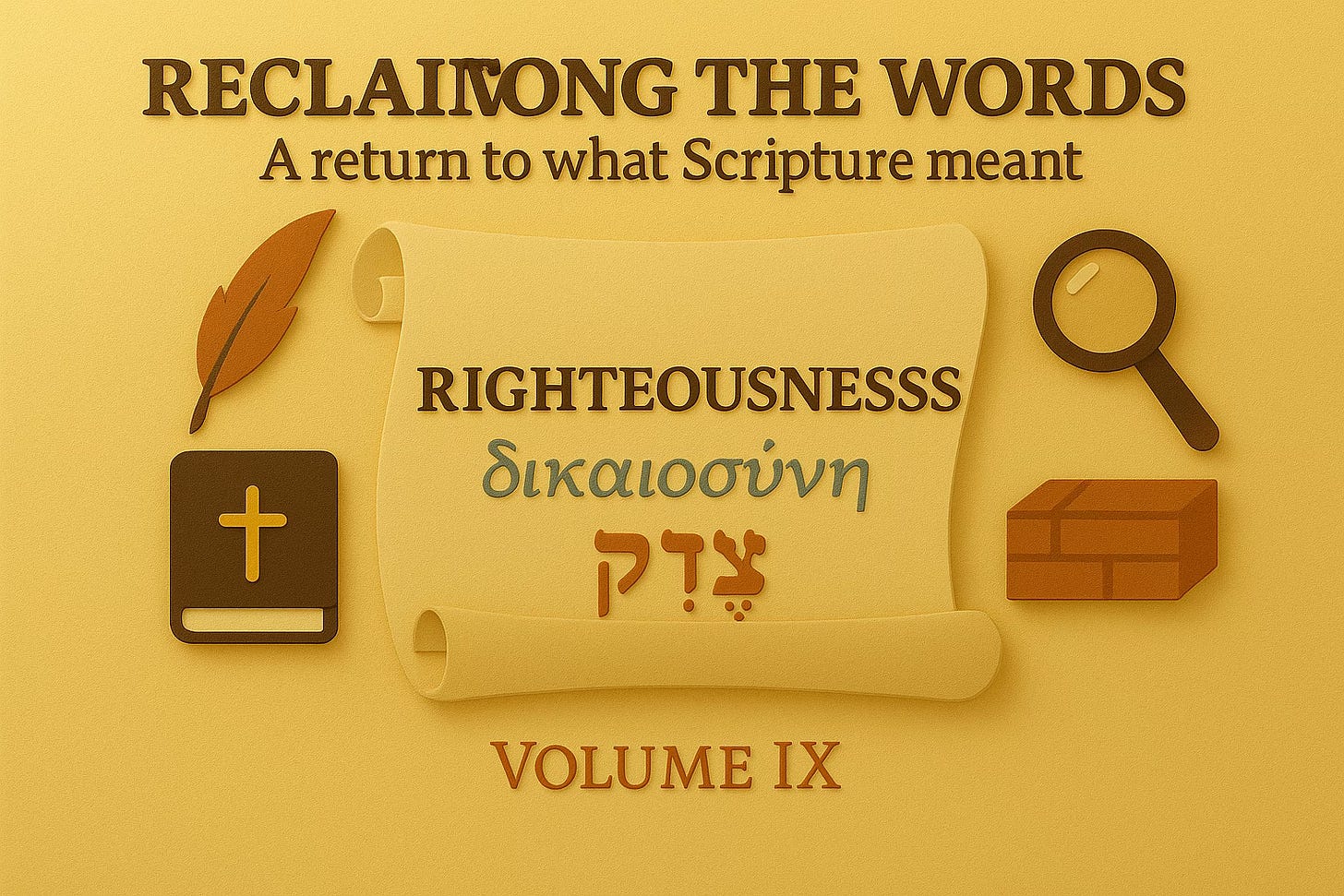Reclaiming the Words, Vol IX: Righteousness
What if “righteousness” isn’t just about being right — but about being in right relationship with Yah and others?
Reclaiming the Words, Vol IX: Righteousness
What if “righteousness” isn’t just about being right — but about being in right relationship with Yah and others?
About the Series: Reclaiming the Words
Language forms faith — and over time, sacred words lose their shape.
Reclaiming the Words is a weekly series dedicated to recovering the original meaning of key biblical terms. By exploring the Hebrew and Greek roots of words like believe, grace, law, repent, holy, faith, gospel, and now righteousness, we rediscover their covenant context, cultural grounding, and Kingdom purpose.
Each word reclaimed becomes a doorway to deeper discipleship, rooted in the life and teachings of Yeshua.
Part IX: What Is Righteousness?
Reclaiming Tzedek and Dikaiosynē as Covenant Faithfulness and Restorative Justice
“But let justice roll down like waters, and righteousness like an ever-flowing stream.”
— Amos 5:24
To many, righteousness means “being a good person” or “keeping the rules.” In theology, it’s often treated as a legal status — something imputed to you. But in Scripture, righteousness is far more relational, restorative, and covenantal.
It’s not just about being declared right — it’s about doing right in relationship with Yah and with others.
The Hebrew Word: Tzedek (צֶדֶק)
The Hebrew word tzedek means:
Righteousness
Justice
Covenantal integrity
It’s not primarily about personal piety — it’s about living rightly in relationship: with Yah, with neighbor, and within the community. Tzedek often appears alongside mishpat (justice) and is active, not abstract.
“He has shown you, O man, what is good; and what does Yahweh require of you but to do justice, and to love kindness, and to walk humbly with your God?”
— Micah 6:8“Yahweh loves righteousness and justice.”
— Psalm 33:5
Righteousness in Hebrew is covenant loyalty that leads to just action.
The Greek Word: Dikaiosynē (δικαιοσύνη)
In the New Testament, dikaiosynē carries over the same meanings:
Uprightness in relationship
Moral alignment with God’s character
Covenantal justice extended to others
Yeshua said:
“Blessed are those who hunger and thirst for righteousness, for they shall be satisfied.”
— Matthew 5:6
Paul writes:
“The Kingdom of God is not a matter of eating and drinking but of righteousness, peace, and joy in the Holy Spirit.”
— Romans 14:17
Righteousness in the Life of Yeshua
Yeshua didn’t just teach righteousness — He embodied it.
He restored the broken, healed the unclean, and lifted the poor — not as charity, but as covenant justice
He warned against external righteousness that ignored the heart (Matthew 23:27–28)
He fulfilled all tzedek — doing what was right before Yah, even unto death
“Let it be so now, for thus it is fitting for us to fulfill all righteousness.”
— Matthew 3:15
Paul and the Restoration of Righteousness
Paul’s writings often center on righteousness by faith — not earned by Torah-keeping but received through trust in Yeshua and lived out in covenant faithfulness.
“For in the gospel the righteousness of God is revealed — a righteousness that is by faith from first to last.”
— Romans 1:17
But Paul never separates justification from justice.
To be declared righteous is to be invited into a new way of life — to be aligned with Yah’s heart for mercy, restoration, and holiness.
Why the English Falls Short
“Righteousness” in English often feels abstract, legalistic, or moralistic. But tzedek and dikaiosynē are covenant terms, not courtroom terms. They describe relational trust, just action, and faithful living under Yah’s reign.
Practical Application:
Live in Right Relationship — Not Just Right Belief
Righteousness is not a religious status — it’s a relational posture.
To live righteously is to:
Walk humbly with Yahweh
Act justly in your relationships
Seek what is right, even when it costs
Stand with the vulnerable, the voiceless, and the forgotten — because Yah does
Let righteousness not be something you possess, but something that flows through you — restoring what is broken, loving what is hard to love, and living faithfully even when unseen.
“Let your light shine before others, so that they may see your good works and give glory to your Father who is in heaven.”
— Matthew 5:16
Five Discussion Questions
How does righteousness change when viewed as relationship, not just rule-keeping?
Why do tzedek and mishpat always go hand-in-hand in the Hebrew Scriptures?
How did Yeshua redefine what it meant to be righteous in His ministry?
What does it look like to live righteously in your relationships today?
Where might Yah be calling you to pursue justice and righteousness in a new way?


